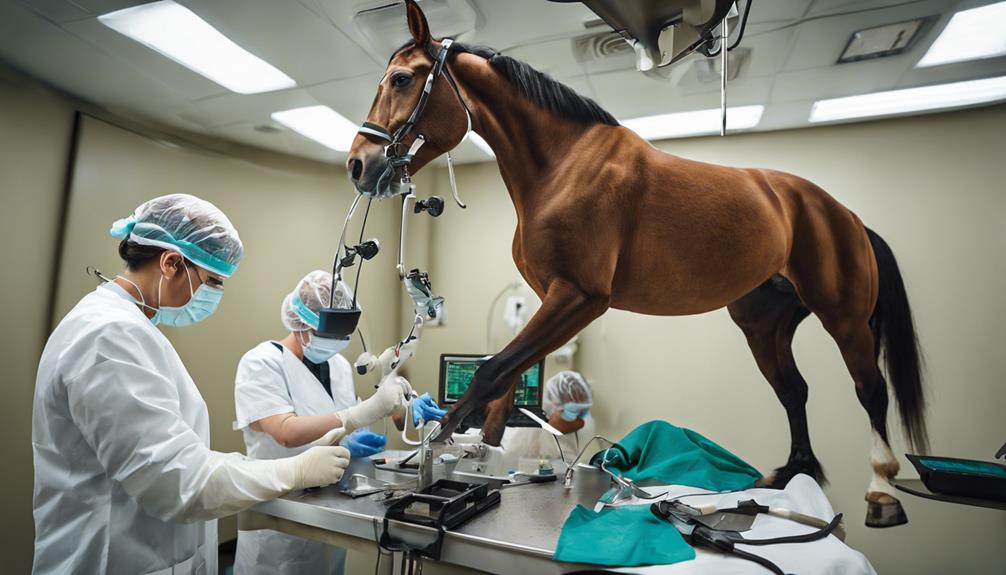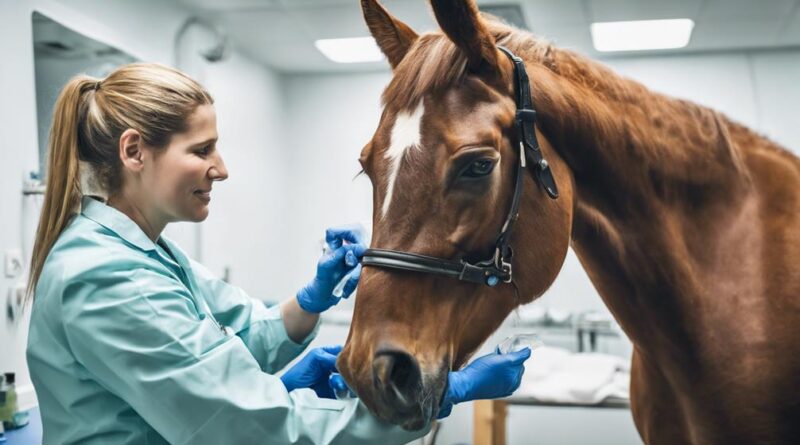Top 7 Practices in Equine Veterinary Medicine
When it comes to equine veterinary medicine, the top 7 practices are like pillars supporting a stable structure. Each practice plays a vital role in ensuring the health and well-being of your horse. From routine dental care to advanced diagnostic imaging, these practices form the backbone of quality equine healthcare.
Understanding these key practices can make a significant difference in your horse's overall health and performance. So, are you ready to explore the essential components that make up top-tier equine veterinary care?
Routine Dental Care
When caring for your horse, regularly scheduling dental check-ups is essential to maintaining their overall health and well-being. Just like humans, horses require proper dental care to ensure they can eat comfortably and maintain good health.
One crucial aspect of equine dental care is teeth floating, which involves filing down sharp points and edges on the teeth to prevent issues with chewing and potential injuries to the cheeks and tongue.
In addition to routine teeth floating, there are instances where dental extractions may be necessary for your horse. Dental extractions involve removing damaged or diseased teeth that may be causing pain or discomfort to the horse. This procedure is typically performed by a qualified equine veterinarian under sedation to ensure the safety and well-being of the horse.
Preventive Vaccinations
Regularly maintaining your horse's health extends beyond dental care; ensuring they receive preventive vaccinations is crucial for their overall well-being. Vaccinations play a significant role in protecting your horse from potentially fatal diseases, helping them lead a healthy and active life. Here are some essential points to consider regarding preventive vaccinations:
- Vaccine Schedules: Consult your equine veterinarian to establish a tailored vaccine schedule based on your horse's age, health status, and lifestyle. Vaccines are typically categorized as core vaccines that are universally recommended and risk-based vaccines that are administered depending on the horse's individual risk factors.
- Herd Immunity: By vaccinating your horse, you not only protect them but also contribute to the concept of herd immunity within the equine community. Herd immunity occurs when a significant portion of the population is immunized, reducing the overall spread of infectious diseases and safeguarding even unvaccinated horses.
- Booster Shots: Remember to keep track of when your horse is due for booster shots to ensure continued protection against diseases. Booster shots help reinforce the immune response generated by the initial vaccine and are crucial for long-term immunity.
- Regular Check-ups: Schedule regular veterinary check-ups to discuss your horse's vaccination status and any updates to their preventive healthcare plan. Your veterinarian will monitor your horse's overall health and adjust the vaccination schedule as needed to keep them protected.
Lameness Evaluation Techniques
To effectively assess lameness in your horse, veterinary professionals employ various techniques that involve thorough observation and diagnostic procedures. When evaluating lameness, one crucial aspect that veterinarians focus on is joint health. Joints play a significant role in the horse's ability to move comfortably and efficiently. Issues such as arthritis or joint inflammation can lead to lameness, making it essential to assess the condition of the joints during the evaluation process.
Gait analysis is another fundamental technique used in lameness evaluation. By observing your horse's gait, veterinarians can identify irregularities or abnormalities in movement that may indicate underlying issues causing lameness. Gait analysis involves watching your horse move at different speeds, on various surfaces, and in different directions to assess any changes or asymmetries in their movement pattern.
During the evaluation, your veterinarian may also perform diagnostic procedures such as flexion tests, nerve blocks, or imaging studies to pinpoint the source of lameness accurately. These tests help determine the specific location and cause of the lameness, guiding the treatment plan effectively. By combining thorough observation, joint health assessment, and gait analysis, veterinary professionals can diagnose and treat lameness in your horse with precision and care.
Nutrition Consultation
Assessing your horse's nutritional needs is a crucial aspect of maintaining their overall health and well-being, complementing the thorough evaluation techniques used in equine veterinary medicine. Equine dietary requirements can vary based on factors such as age, activity level, and health conditions. A nutrition consultation with a veterinarian can help tailor a diet plan specific to your horse's needs, ensuring they receive the right balance of nutrients for optimal health.
Key Points in Equine Nutrition Consultation:
- Customized Diet Plan: A veterinarian can create a personalized diet plan considering your horse's specific requirements.
- Weight Management: Proper nutrition plays a vital role in weight management for horses, helping them maintain an ideal body condition.
- Health Conditions: Dietary adjustments may be necessary for horses with health issues such as metabolic disorders or digestive problems.
- Nutrient Balance: Ensuring the right balance of nutrients like protein, vitamins, and minerals is essential for overall health and performance.
Advanced Diagnostic Imaging
Effective utilization of advanced diagnostic imaging techniques enhances diagnostic accuracy and treatment planning in equine veterinary medicine. MRI technology and ultrasound techniques play crucial roles in diagnosing various conditions in horses.
MRI technology provides detailed images of soft tissues, joints, and the nervous system, aiding in the diagnosis of injuries such as ligament tears, cartilage defects, and neurological disorders. By allowing veterinarians to visualize structures that may not be clearly visible on traditional X-rays, MRI technology enables more accurate diagnoses and targeted treatment plans.
Ultrasound techniques are another valuable tool in equine veterinary medicine. They're commonly used for evaluating soft tissue structures like tendons, ligaments, and muscles. Ultrasound can help identify issues such as tendonitis, muscle tears, and fluid accumulation in joints. Moreover, ultrasound-guided procedures, such as joint injections or biopsies, are becoming increasingly popular due to their precision and effectiveness.
Incorporating advanced diagnostic imaging into your equine veterinary practice can significantly improve your ability to diagnose and treat various conditions. By staying current with MRI technology and ultrasound techniques, you can offer your equine patients the highest standard of care. These imaging modalities not only enhance your diagnostic capabilities but also contribute to better outcomes and increased client satisfaction.
Emergency Preparedness
Incorporate essential emergency preparedness protocols to safeguard the well-being of equine patients under your care. Being prepared for emergencies is crucial in ensuring the safety and health of the horses you treat. By establishing clear emergency protocols and disaster response plans, you can effectively handle unexpected situations and provide timely care to your equine patients.
Emergency Preparedness Tips:
- Develop a Comprehensive Emergency Plan: Create a detailed plan outlining steps to take in various emergency scenarios such as natural disasters, accidents, or medical emergencies.
- Regular Training and Drills: Conduct regular training sessions and emergency drills with your team to ensure everyone knows their roles and responsibilities during a crisis.
- Emergency Supplies Stockpile: Maintain an adequate stockpile of emergency supplies including medications, bandages, and first aid equipment to address immediate veterinary needs.
- Establish Communication Protocols: Set up clear communication channels with staff, clients, and local authorities to coordinate effectively during emergencies and streamline disaster response efforts.
Surgical Expertise

To excel in equine veterinary medicine, honing your surgical skills is paramount for providing optimal care for horses in need. Equine surgery requires precision, knowledge of equine anatomy, and the ability to handle unexpected situations with calm expertise.
When it comes to equine anesthesia, understanding the unique pharmacokinetics of horses is crucial to ensure safe induction, maintenance, and recovery from anesthesia. Being well-versed in different anesthetic protocols and monitoring techniques is essential to minimize risks during surgical procedures.
Wound management is another critical aspect of surgical expertise in equine veterinary medicine. Proper wound assessment, cleaning, and closure techniques are vital to prevent infections and promote optimal healing. Understanding the healing process of equine wounds and being able to adapt your treatment plan based on the specific needs of each case is key to successful outcomes.
Developing proficiency in surgical techniques such as colic surgery, orthopedic procedures, and soft tissue surgeries will allow you to address a wide range of conditions effectively. Continuous learning, staying updated on the latest advancements in surgical technology, and seeking mentorship from experienced equine surgeons are valuable strategies to enhance your surgical expertise in equine veterinary medicine.
Rehabilitation Programs
Engage in tailored rehabilitation programs to optimize recovery and performance outcomes for equine patients. These programs are essential in helping horses regain strength, mobility, and overall well-being after injuries or surgeries. By focusing on specific exercises and therapies, equine physical therapy can significantly enhance the healing process and improve the horse's athletic abilities.
Key Practices for Effective Rehabilitation Programs:
- Customized Exercise Routines: Designing tailored exercise plans that target the specific needs and abilities of each horse can promote faster recovery and prevent further injuries.
- Nutritional Support: Providing the necessary nutrients and supplements can aid in muscle repair, energy levels, and overall health during the rehabilitation process.
- Monitoring Progress: Regular evaluation of the horse's condition and adjusting the rehabilitation program accordingly is crucial for achieving optimal results.
- Hydrotherapy for Horses: Incorporating water-based therapies like swimming or underwater treadmills can be beneficial for improving strength, flexibility, and cardiovascular fitness without putting excessive strain on the joints.
Frequently Asked Questions
How Can Horse Owners Improve Their Horse's Mental Well-Being and Overall Quality of Life?
To boost your horse's mental well-being and quality of life, engage in activities that provide mental stimulation and establish consistent exercise routines.
Stimulate your horse's mind with puzzles, interactive toys, and varied environments.
Regular exercise, such as riding, lunging, or turnout, can help maintain physical health and mental balance.
What Are Some Common Alternative Therapies or Treatments That Can Benefit Equine Health?
To improve your horse's health, consider alternative therapies like acupuncture, herbal supplements, chiropractic care, and massage therapy.
These treatments can benefit equine health by addressing various issues such as pain management, muscle tension, and overall well-being.
Incorporating these therapies into your horse's care routine can support their physical and mental health, contributing to a better quality of life for your equine companion.
How Does a Horse's Age and Breed Affect Their Veterinary Care Needs?
As a horse owner, you need to consider how age and breed impact your horse's care. Different breeds may have specific nutritional requirements and grooming practices to keep them healthy. Older horses might require more attention to dental care and tailored exercise needs.
Are There Any Specific Environmental Factors That Can Impact a Horse's Health and Well-Being?
In caring for your horse, consider the impact of climate and pasture management on its health and well-being. Different environmental factors like extreme temperatures or poor pasture conditions can affect your horse's overall wellness.
How Can Horse Owners Best Communicate With Their Equine Veterinarians to Ensure the Best Care for Their Animals?
To ensure the best care for your horse, effective communication with your equine veterinarian is key.
Be proactive in discussing your horse's health and any concerns you have. Ask questions, share observations, and be open about your horse's lifestyle.
Conclusion
In conclusion, by following these top 7 practices in equine veterinary medicine, you can ensure the health and well-being of your horse.
From routine dental care to advanced diagnostic imaging, each practice plays a crucial role in maintaining your horse's overall health.
By staying proactive with preventive vaccinations, nutrition consultation, and lameness evaluation techniques, you can address any issues early on and provide the best possible care for your equine companion.
